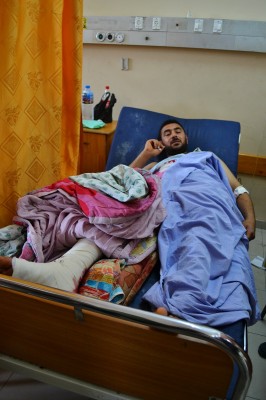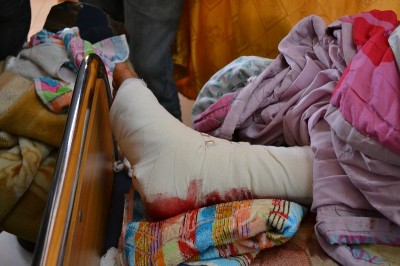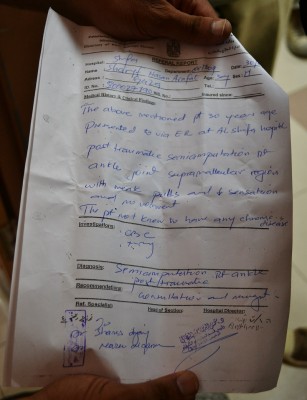In the early hours of the morning of
Sunday June 30th 2013, Sharif Arafat, a 30-year-old Palestinian
fisherman, was injured on a fishing boat off the coast of Soudania,
North of the Gaza Strip.
The captain of the boat,
Nafiz At Habeel, reported that during the night the strong wind had
pushed the vessel about 6 miles from the coast of Soudania. Around
midnight an Israeli military navy ship approached and then retreated. In
the early hours of the morning, at around 3:30am to 4:00am, the
fishermen threw their nets into the sea. Once again, an Israeli navy
ship approached the fishing boat and this time started shooting. Nafiz
told us that the fishermen tried to hide in order to avoid the bullets,
while Sharif Arafat ran to the side where the fishing nets were. Sharif,
an inexperienced fisherman, did not know how to escape in the event of
gunshots by the army. One of the nets became caught up around his leg.
“Sharif was terrified, his ankle was
trapped”, Nafiz said. As he couldn’t swim, Sharif clung to the boat as
not to fall into the water, while the nets pulled him down. His ankle
was severely fractured and broken and he fell into the water. Nafiz told
us that he had tried to pull in the nets with the engine. “These nets
float – I cried at Sharif to cling to a ball of the fishing net”, said
Nafiz. Sharif was then pulled on board and taken to the port of Gaza
City on a ‘hasaka’, a small boat that usually accompanies the vessels.
During the incident the fishermen had
relit the lights of the boats, which usually go off when they cast their
nets. The Israeli navy has since moved away, probably because the
soldiers had realized that something serious had happened.
We met Sharif Arafat at Shifa hospital in
Gaza City, where he was hospitalized following the accident. The
hospital report states that Sharif had a partially amputated right ankle
due to trauma.
Sharif Arafat is not a professional
fisherman. “I went fishing only because of the economic situation, I
cannot even swim”, said Sharif, who had begun to fish only 5 months
earlier. Sharif is married, has one child and his wife is pregnant with a
second child.
Sharif was frightened by the idea that
his foot could be amputated. His brother Alaa, next to him in the
hospital, was in tears. The same evening Sharif was transferred urgently
to a hospital in Israel to be operated on, thanks to the intervention
of the Palestinian Center for Human Rights who called for an
acceleration of the procedures such was the emergency. In the Gaza Strip
such surgery was not available.
We are still waiting for news on the conditions of Sharif Arafat.
Background
Israel has progressively imposed
restrictions on Palestinian fishermen’s access to the sea. The 20
nautical miles established under the agreements of Jericho in 1994
between Israel and the Palestine Liberation Organization (PLO), have
been reduced to 12 miles under the Bertini Agreement in 2002. In 2006,
the area allowed for fishing was reduced to 6 nautical miles from the
coast. Following the Israeli military offensive “Cast Lead” (2008-2009)
Israel has imposed a limit of 3 nautical miles from the coast,
preventing Palestinians from access to 85% of the water to which they
are entitled according to the Jericho agreements of 1994.
Under the agreements reached between
Israel and the Palestinian resistance after the Israeli military
offensive in November 2012, “Pillar of Defense,” they consented that
Gazan fishermen can again fish up to 6 nautical miles from the coast.
Despite these agreements, the Israeli navy has not stopped attacks on
Gaza fishermen, even within this limit. In March 2013, Israel imposed
once again a limit of 3 nautical miles from the coast, saying that the
decision had been taken following the sending of some Palestinian
rockets towards Israel. On Wednesday 22nd May, the Israeli military
authorities announced through some media outlets the decision to extend
the limit again to 6 nautical miles from the coast.
We join the call of the fishermen and ask
our governments to press Israel to stop attacking and arresting
Palestinian fishermen and to allow them to fish freely.



No comments:
Post a Comment
Note: Only a member of this blog may post a comment.